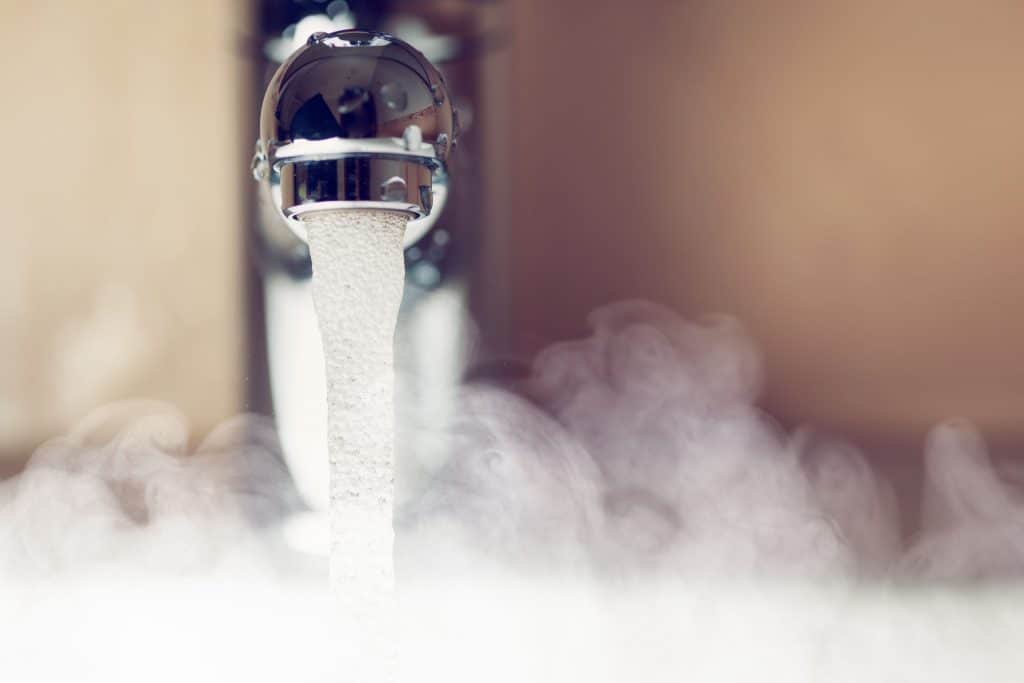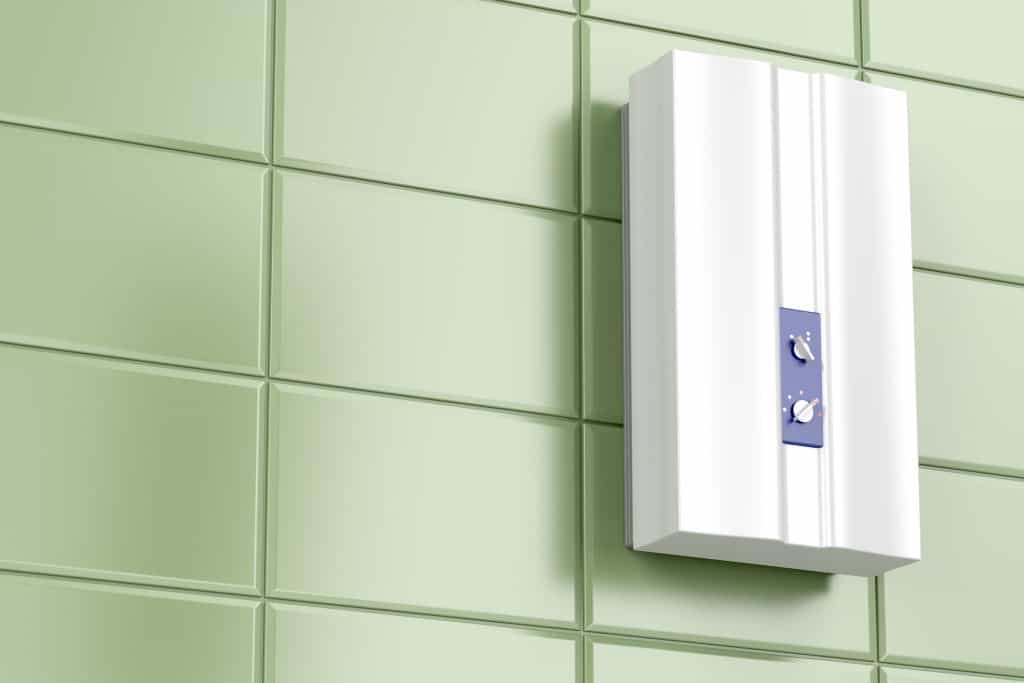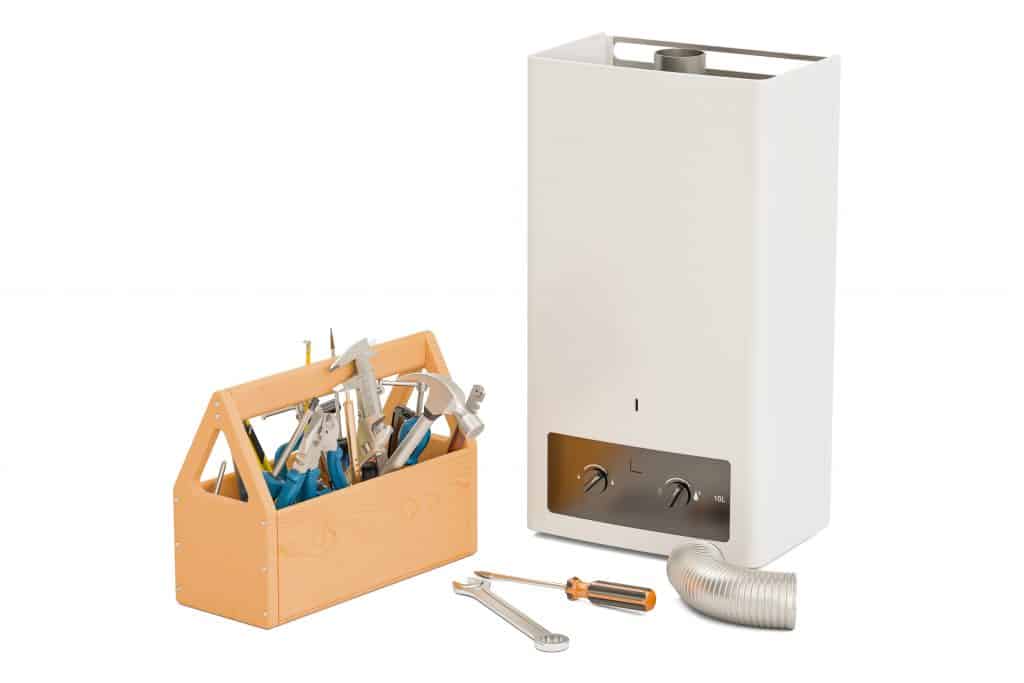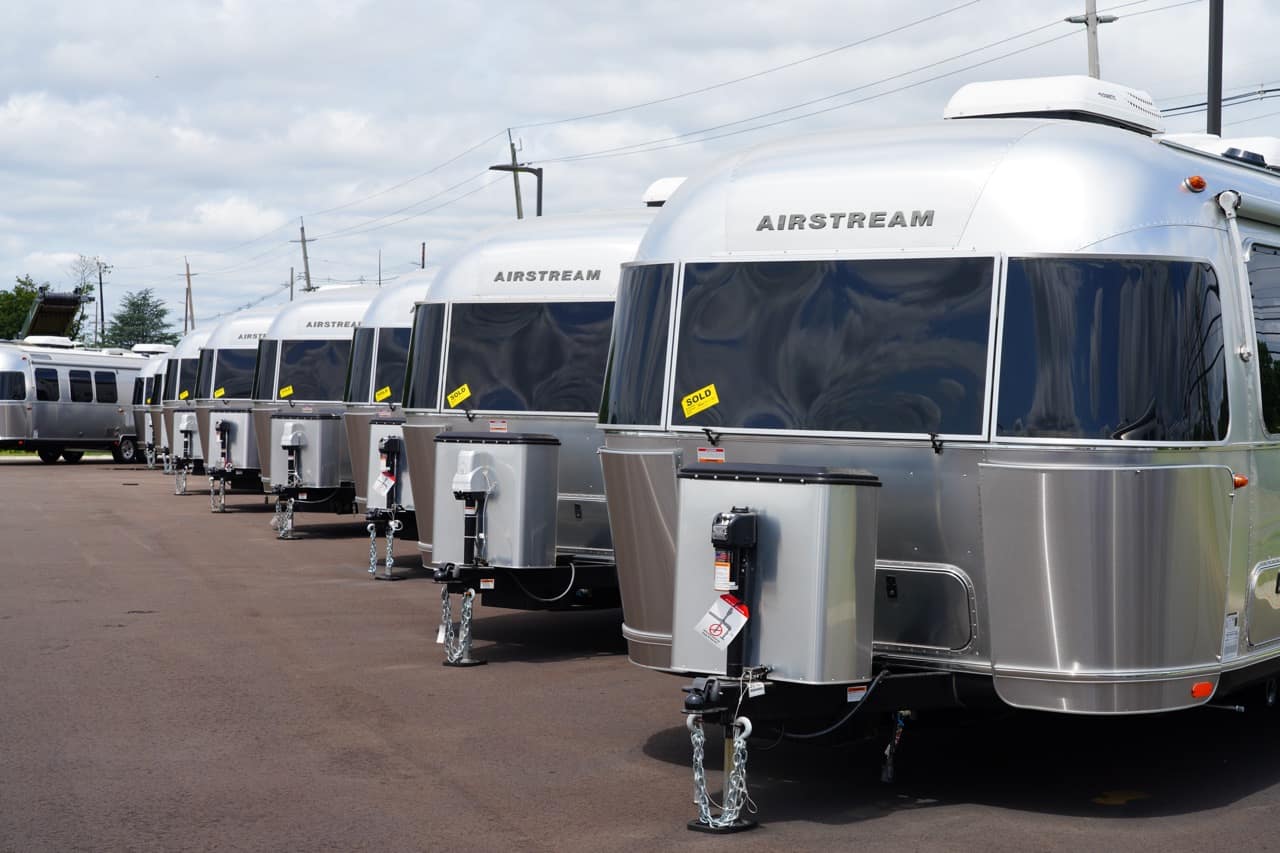
Tankless water heaters for RVs sound like such a great idea. This appliance is normally found in a residential home. People love how they always give instant hot water. It works by heating the water as it passes through the heater. Instead of keeping an entire tank of water hot all day and all night like a traditional water heater does, tankless water heaters heat water instantly and continuously. You will never run out of hot water when you go tankless. But is is such a great idea for RVs?
Tankless Water Heaters for RVs Considerations
Are tankless water heaters for RV a good investment for your rig? That depends on how you use your RV. A tankless water heater is a good investment for your RV if you live in it full time or it gets a lot of use. Full-time RVers will find the amount of money saved on electric bills can pay for the unit over a few years. But if the RV doesn’t get constant use, then a tankless heater is not as compelling from an economic point of view.
Read on to learn all about tankless water heaters. We will look at the things you should consider when deciding if a tankless water heater is a good investment for you and your RV.
Why Go Tankless?
There are some big benefits to tankless water heaters. These water heaters have had a surge in popularity over the last decade or so. In new homes, they are often installed instead of traditional full-tank water heaters.
- They deliver continuous hot water
- Use less energy
- Can last twice as long as traditional tank-style water heaters.
Let’s look at the advantages of on-demand RV water heaters in detail.
Continuous Hot Water
The most compelling feature of a tankless hot water heater is that when you use one, you will actually never run out of hot water! This is a very big draw for people, especially RV enthusiasts.
A normal RV tends to have a small hot water tank runs out really fast. The normal tank size is six gallons. Ten gallon RV water heaters are usually an upgrade.
With people trying to shower, wash dishes, and do laundry, your hot water can be gone before you know it. Warm water won’t come back until the heater fires up a whole other batch of water.
This is not the case with the tankless RV hot water heaters. When the tankless heater detects that the water is flowing, it activates the heating unit (gas or electric). Then it begins outputting hot water almost instantly.
So this is the first question you need to ask yourself:
- Are the demands on my hot water constantly more than the supply of hot water in my RV? If the answer is yes, then you might be someone that would benefit from the capacity of the tankless water heater to heat water instantly and indefinitely.

Energy Savings
The other most compelling feature of a tankless water heater is their energy use. In addition to delivering near-instant and continuous hot water, tankless water heaters can do it with less energy than traditional hot water tanks.
For a traditional hot water tank to work, it has to keep the whole tank of water hot, all the time, without breaks. And to do that, it needs a lot of energy.
The tankless heater avoids this whole situation by heating water only when someone turns on a faucet and the water is running through the heater. There are both gas and electric tankless water heaters, but they operate on the same principle.
When the heater detects that water is flowing, it immediately turns on an electric heating element or ignites a flame. The water passing through is instantly heated as it goes out to the pipe system.
According to the Department of Energy, this mode of heating water can use about 24-34% less energy versus using a traditional hot water heater with a big old tank.
If you have enough propane to power your traditional hot water tank for 3 days, then that would translate into an increase of one-third, or one extra day, for a total of 4 days. Accordingly, if you currently have enough for 6 days, a one-third increase would get you to 8 days.
Of course, there are various other demands on your propane and batteries. But dropping any single demand by one-third is not insignificant. If you are a serious boondocker, you will stand to benefit the most from these energy savings.
Built to Last Technology
This one is a little more tricky. According to the statistics from the Department of Energy, a really good tankless water heater will last for 20 years. A traditional water heater will last for 10 to 15 years. A tankless heater can last you up to twice as long.
Normally RV hot water heaters are not used all of the time
So if you are a full-time RV dweller, you may see some duration benefit. Tankless heaters last longer than conventional models. When viewed from this angle, that means that although their cost is higher initially, the cost per year of operation can be closer to that of traditional water heaters.
If your RV is not lived in full time, then it is left more up to chance whether your tankless heater will really last that much longer.
Lower Cost of Ownership
Tankless water heaters for RVs use much less energy than traditional tank water heaters. Since they last longer than a traditional hot water heater, operating costs can be lower per year of use.
This will depend on exactly how much hot water you use and how much the system costs you. The total costs of going tankless can actually be comparable (or less) than traditional.

Drawbacks of Tankless Water Heaters for RVs
For all of their benefits, tankless water heaters for RVs does have some drawbacks. Their higher cost, lower output, and fairly complicated installation are reasons why people might choose to forgo getting one installed. Here we explore each of these drawbacks in detail.
Low Flow Rate of Water
Tankless water heaters have a certain flow rate of water that they are built to handle. If you try and push it beyond the flow limit, it will not be able to
To estimate your demand, think about how many faucets you would like to be able to run at a time. You will then be able to use that to determine how much capacity you will need in your tankless heater.
A stand-alone sink will probably not use more than 1 gallon per minute (GPM). But a shower will probably use closer to 2 GPM.
Use these numbers to estimate your capacity. Add to that your laundry and anything else you might be using to get a good idea of the capacity you think you would like to have.
Good capacity can get pricey pretty quick. Which leads us to…
The Cost of Tankless Water Heaters for RVs
Tankless water heaters for RVs come in a huge range of prices. This reflects the wide range of capacities that these heaters can produce.
On the low end, there are tankless water heaters that are designed to provide enough hot water for just one pipe (faucet) at a time. They can handle about 1 to 1.5 gallons per minute.
You can find them in the $100-$200 price range, and they even sell them at Walmart and Home Depot/Lowe’s.
If you are not super committed to spending a lot of money to fix your hot water shortage problem, these low-capacity types of units can be useful. They won’t be able to provide hot water to all of your faucets at the same time. But they will provide continuous hot water for one faucet at a time.
To get a decently capable heater though, it will cost you a good chunk of change. Some instant water heater units are capable of heating enough water for every faucet. These can cost upwards of $1,000.
Most people that install these tankless hot water heaters will opt for something in between. Normally you will want a model that can heat more than one faucet at a time.
This kind of capacity will cost you anywhere from $500 to $1,000. In this price range, you can get a capacity of 3-5 gallons per minute. For reference, one faucet will use about a gallon per minute in an RV. A shower uses around two GPM.
Complicated Installation

Most RVs are not designed to accommodate a tankless water heater. There is no place to just plug it in, you need to take care of putting in the system yourself, routing the water around the old hot water tank and into the tankless heater.
You will also need to hook up the electricity or propane. This is not too complicated but for some people might be more than they are comfortable doing.
In fact, one of the biggest factors in what a tankless heater will cost you isn’t even the heater itself. It’s the installation cost. If you have the skills to wire it up or to create a propane gas connection, then you won’t need to worry about any sort of installation cost.
If you don’t feel comfortable doing those things, hiring someone will be an extra expense.
The Final Verdict on Tankless Water Heaters for RVs
So, are tankless water heaters for RVs a good investment? Do the benefits outweigh the costs? The answer depends mainly on how you use your RV. If you live in your RV full time, then this savings will translate into a much higher actual dollar amount of savings versus someone who only uses their RV for a few weekends a year.
If you are really interested in a tankless water heater but worried about the installation, research the installation process. See if it is something you might feel comfortable doing. You might find that you can do it.
YouTube is full of installation guides for tankless water heaters for RVs. It shouldn’t be too much of a problem to install one yourself.
Your actual costs of tankless water heaters for RVs will vary. But if you install it yourself, and if you live full time in your RV, the numbers might look something like this:
Upfront cost of about $1,000 for the tankless heater vs an $800 initial cost for a traditional heater. That is an extra $200 you are spending. But by lasting 5 to 10 more years, that translates to a cost savings per-year of operation.
When you add to this the fact that you are using one-third less energy, if your annual energy cost to heat the water is $200, that is a savings of about $60 per year. So that savings alone could pay for itself in just a few years.
If you use your RV a lot less, the numbers will not be as compelling from an “investment” point of view. People who install tankless water heaters in RVs that do not get much use do so mostly out of a desire for continuous hot water and other convenience reasons.
These reasons for going tankless are perfectly fine. But speaking from an “investment” point of view, it is not as compelling for part-time RVers. But over the lifetime of the RV, it could still have an effect on your operations costs.
And finally, if you ever decide to sell your RV, then having a tankless heater can add to the overall value.
Tankless water heaters for RVs are growing more popular. Everyone loves not running out of hot water. Having a decent unit already installed could be a strong selling point when trying to attract buyers.
Conclusion
So there you go. Tankless water heaters are way cool, a bit more expensive, and full of possibility. Let me know what you decide. Comment on other considerations to decide if tankless water heaters for RVs are a good investment.
As for me? I’m a big fan of efficiency. And I love limitless hot water. I am a big fan of going tankless.
Related Questions:
Is a tankless heater difficult to install? Depending on your abilities, a tankless heater should not be too difficult to install. It will require some knowledge of electricity or gas, depending on which energy source you choose. There are plenty of “how-tos” online if you want to self-install.
Is gas or electricity cheaper to operate? It depends on your electricity rate, but generally gas is cheaper to use for heating water. That being said, if you get a majority of your electricity from a campground where utilities are included, then electricity would be a far cheaper option.




I am curious when this was written and if this article is good for 1-2 people? I know times have changed and somethings are cheaper & some are more expensive.
Newly full time RVers family of 5. Updating our 30′ travel trailer.
My 2004 Beaver Marquis has an Aqua Hot water system… After spending a lot of money on repairs and upgrades it, is now to the point of needing replacement. A new Aqua Hot system would run about $16-18,000… No way I want to spend this…
Considering installing two tankless systems… One for sink and shower and another to supply hot water to our heating system….
Any ideas or knowledge if this type of system would work? As we will not be replacing an old unit the location in our coach would be in the area the Aqua Hot is located…
Thanks for any info you can provide…
Douglas any response? We are in similar situation… $$$$. You made it?
Thanks;
Julio
After much research, I self-installed a Precisiontemp rv550 in my Rpod about 5 years ago and couldn’t be happier. I did have to slightly enlarge the opening from the 6 gallon tank heater but with careful measuring and a bit of additional reinforcement around the opening it was worth doing myself. As a full timer, I really appreciate the freeze protection of this heater. Given the increase in the price of propane, I’m even happier that I made the switch. With the right showerhead, water flow is not an issue.
Very good article. I’m contemplating putting in a tankless rv water heater and your information was helpful. However, I see prices of a very reputable tankless water heater(s) much less in price than you quoted in your review. Most I saw on Amazon are in the $500 – $600 range. Installation is shown on u tube videos by rv professionals and looks quite straight forward. Plus most models offered are manufactured to fit right in your rv space of the old tank models, pretty nice!! Again, thanks for your article.